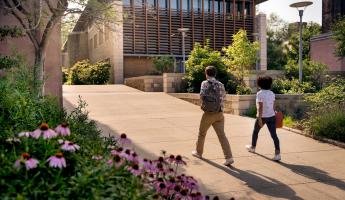
Bekenstein Climate Leaders Program Frequently Asked Questions
On This Page
1. What is the Bekenstein Climate Leaders Program at the Yale School of the Environment?
This transformative program aims to increase the number of YSE and Yale graduates working to address the climate crisis. Through a combination of scholarships, internship stipends, and post-graduate incentives, the program will help make it more affordable for emerging leaders to pursue high-impact careers in areas of high need, such as government and the nonprofit sector. More specifically, the Climate Leaders Program will offer an additional $10,000 scholarship to up to 30 qualified master’s students in each class. With the window of time to reduce emissions rapidly closing, the initial primary focus of the Bekenstein Climate Leaders Program will be on climate change mitigation.
2. Who is eligible to become a Bekenstein Climate Leaders Scholar? How are Bekenstein Climate Leaders Scholars selected?
The Bekenstein Climate Leaders Program is a competitively awarded scholarship that is open to Yale School of the Environment students with substantive lived, academic, and/or professional experience or a clear vision for a future working in advancing climate solutions and climate change mitigation. A variety of factors are considered when evaluating individual applications, including but not limited to professional goals, academic record and professional experience. The supplemental application is not meant to be onerous or a barrier to entry but will help identify students who are committed to advancing climate solutions and climate change mitigation work following graduation.
3. How many Bekenstein Climate Leaders Scholars are accepted?
The number of Bekenstein Climate Leaders Scholars selected varies year to year, and selection is based on a competitive review of applications. The scholarship program class size will be approximately 30 per class per year. A variety of factors are considered when evaluating individual applications, including but not limited to academic records and professional experience, as well as future goals as they relate to climate mitigation. This information can be found on the YSE admissions application portal.
4. When can I submit my application for the Bekenstein Climate Leaders Program? What is the application deadline?
For Incoming Students:
Applications are currently being accepted for admission to the 2024-25 academic year. The deadline for the master’s application and Bekenstein Climate Leaders supplemental application is December 8, 2023, for admission to the 2024-25 academic year. Both applications are due by this time.
For Current Students:
Any current YSE student who will be continuing their studies as a returning student at YSE in the Fall of 2024 or Spring of 2025 is eligible to apply for this competitively awarded scholarship. Joint degree students completing a YSE portion of their program in Fall 2025 or a later term are eligible as well. Joint degree students should apply in the year they will be attending YSE.
The Fall 2024 award application for returning YSE students will open on January 1, 2024, and close on March 1, 2024. Bekenstein award recipients will be notified by May 1, 2024, in time for the 2024 academic semester start. Normal YSE financial aid rules will apply; the award will be prorated based on full or part-time status and will only apply to terms enrolled at YSE.
An invitation to apply will be shared with current students closer to the January 1, 2024, open date.
5. How do I apply for the Bekenstein Climate Leaders Program?
Prospective students applying to the incoming cohort must complete the regular masters application for all potential YSE master’s students, and complete the supplemental application for the Bekenstein Climate Leaders Program. The supplemental application form is housed in the application portal, the same as the master’s application. The supplemental application form will be enabled only when you complete the following step in your application:
- Respond “YES” to the Bekenstein Climate Leaders Program question found in the “application information” section of the application form.
6. What is required as part of the Bekenstein Climate Leaders Program application?
- Two short essays of no more than 300 words each:
- How would you describe the characteristics of a good leader? Describe the ways you have demonstrated leadership in your work to date, either with an experience directly related to climate change solutions, or more broadly?
- Given that advancing climate change solutions is a complex and multidisciplinary challenge, what aspect(s) are you most interested in working on and why? Five years after graduation, where, and on what types of projects, do you hope to be working?
- Two multiple-choice questions about your intended professional goals.
- 1. What sector are you interested in working in?
- 2. Which area(s) are you interested in working in? (Select all that apply)?
- One letter of recommendation is required. If your recommender is also submitting a reference for your master's admissions application, please note that a different letter addressing the specific prompt from this recommender is required.
7. Do I need to complete the YSE financial aid process if I am pursuing the Bekenstein Climate Leaders scholarship?
No, the Bekenstein Climate Leaders scholarship is merit-based and does not require completion of the YSE financial aid process. For YSE need-based funding you must complete all applicable forms by the deadline.
8. Are all Bekenstein Climate Leaders Scholars eligible for the post-graduate stipends?
There will be a separate process for the post-graduate stipend; selection for the scholarship does not guarantee selection for the post-graduate stipend.
Contact Master’s Admissions
Introduce yourself to the YSE master’s admissions team.

